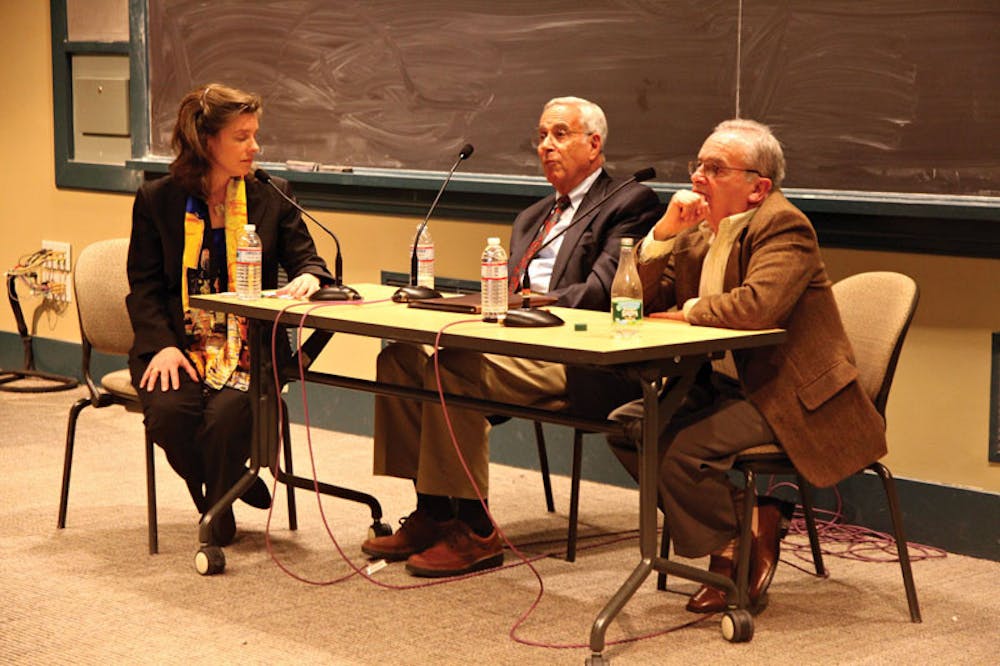“We have to rely on you to pass on the word to your friends, your colleagues, to the next generation to make sure we never forget the Holocaust,” Steen Metz, a Holocaust survivor, told audience members Sunday evening at “Surviving the Unthinkable,” an event organized by the Holocaust Initiative at Brown University.
Metz and fellow survivor Al Linder spoke to a crowded Salomon 001 about their personal experiences in concentration camps during World War II, highlighting the horrors many Jews, Roma, homosexuals and political dissidents endured under the Nazi regime. Both men were only children when they were taken from their homes and brought to camps.
Many students and community members attended the presentation, with some sitting in the aisles or standing in the back of the room. After Metz and Linder shared their stories, Professor Maud Mandel, associate professor of Judaic Studies, led a brief question and answer section before opening the floor to audience questions.
Benjamin Heller ’13 started HIBU as an official organization last fall, though this is the second year he has staged an event highlighting the personal stories of Holocaust survivors. When Heller’s grandmother, Helen Shabas, came to Brown last spring to share her experience, Heller said he realized there was interest among students in learning more about the Holocaust from a personal perspective. According to a short film Heller screened at the beginning of the event, only 20 percent of Brown students he surveyed had heard a Holocaust survivor speak about his or her experience in person.
Linder spoke first about living in Bukovina, an area now divided between modern-day Romania and Ukraine, during World War II. In 1941, the fascist government of Romania instituted laws and restrictions for Jews, similar to the Nuremberg laws imposed on German Jews. “That is when our nightmare began,” he said.
Later in 1941, Linder’s maternal grandparents, as well as many other Jews in their community, were shot by their anti-Semitic neighbors. Then, all remaining Jews in Bukovina were forced to move to ghettos where over 70,000 people were packed into an area approximately eight blocks by six blocks, living in cramped quarters with multiple other families.
Linder and his family were sent to the Bershad concentration camp in Ukraine, where their lives only worsened. The camp was hit immediately with an epidemic of typhus that killed both his baby sister and his paternal grandparents. Other diseases, starvation and execution accounted for the deaths of many more prisoners. Linder said he believed his parents survived because of the strength of their faith, adding that faith continues to be extremely important in his life today.
After living in the camp for years, Linder and his parents were finally able to escape in 1944 by following behind a large group of Russian soldiers marching by the camp.
Metz spoke next and shared a fairly different experience from Linder’s. Where he lived in Denmark, Jews were generally treated equally even during Nazi occupation. Though his father was Jewish, neither Metz nor his mother practiced Judaism. He said he lived a fairly normal life until 1943 when he and his family were arrested and transported in a cramped cattle car to Terezin concentration camp.
In the camp, Metz faced inhospitable and unsanitary living conditions, as well as cruelty from German guards. His father died of starvation less than six months after their arrival. Metz was completely shut off from the outside world until April 1945, when the Red Cross came to the camp and freed the inhabitants. “We couldn’t believe it until we were on the buses. It was wonderful. It was a miracle,” he said.
Both speakers spoke passionately about the importance of learning from the Holocaust and expressed disappointment with the existence of similar situations today. Metz cited the Rwandan genocide and the violence in Syria, while Linder mentioned continuing anti-Semitism in many of the Nordic states. Metz also said that anti-Semitic behavior increased 20 percent in 2012, a statistic that upset him very much.
Both men also described a sense of obligation to share their experiences. Metz said he tries to give a presentation once a week so that he can help spread a message of tolerance and work to prevent an event like the Holocaust from being repeated.
Heller is graduating this year, but said that HIBU will continue to put on these events to educate the Brown community and honor the legacies of Holocaust survivors. “What people forget is that these people are still around, they’re still alive, they’re still willing to talk about it,” he said.
A previous version of this article incorrectly stated that Holocaust survivor Steen Metz was freed from a concentration camp in April 1944. In fact, he was freed in April 1945. The Herald regrets the error.

ADVERTISEMENT




